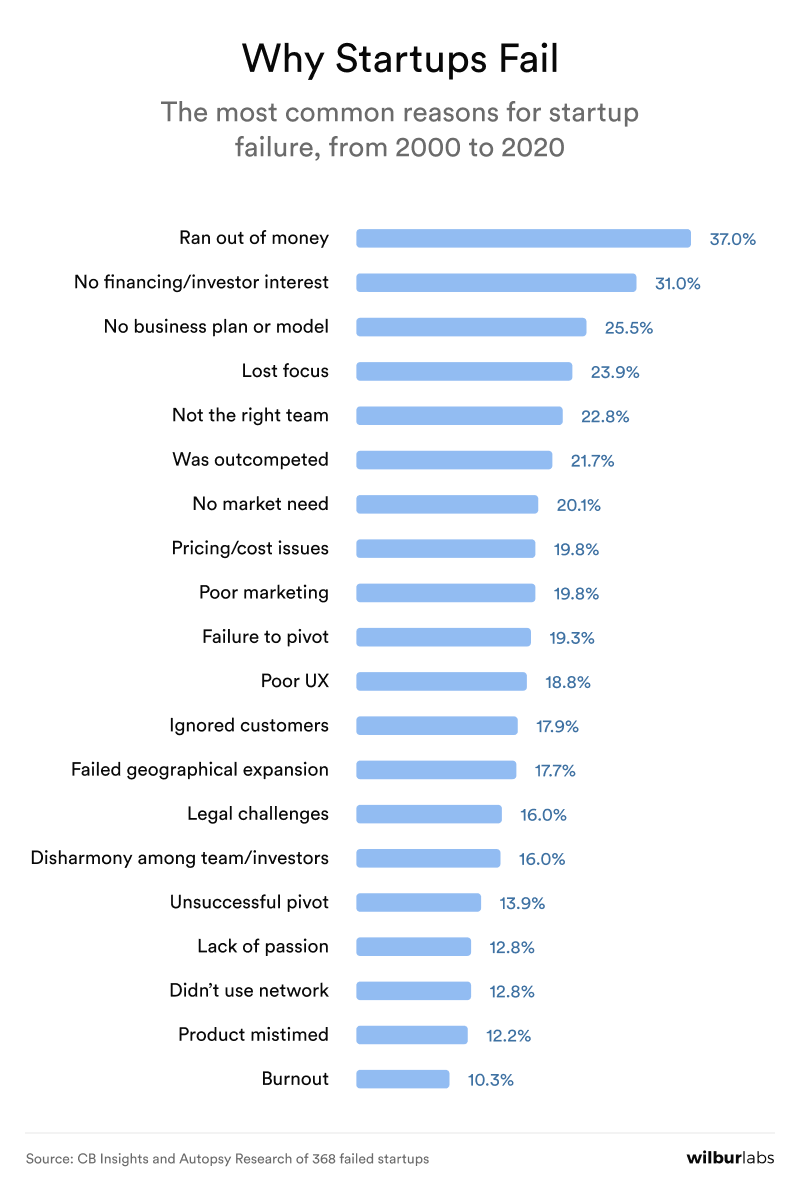Why do startups fail – In this article, we talk about 5 main reasons why startups fail. Running a startup is hard – no doubts there. It is worse when you have to go through a failed startup experience. Sure, it builds resilience, but at the cost of quite a lot. If you’re building a startup, it helps to be aware of the most common problems so that you can be conscious and prevent these problems as part of your strategy to build your startup.
Why do startups fail?
I’ve been reading a bit about the reasons why startups fail. Although most founders talk about money, it is one of the many reasons. We have plenty of examples of well-funded startups failing. The most common reasons for startup failures are – developing something which customers don’t want. Or developing something which is not scalable enough.
The key requirement of a startup is scalability – it needs to solve a problem well enough for a large group of users. Most investors in startups are well aware of the risks, but they will be looking at you to develop a product or solution which can be used by most users. In this case – the user refers to a paying customer.
Running out of money
Obviously, this is one of the most common reasons for startup failure. Although we try to bootstrap in a startup, it takes far too much time to develop something of value. Even if you do, the market would’ve moved on or changed by the time you produce a result.
In a non-startup scenario, funds are adequately designated and it is less of a do or die situation for new and innovative projects. As a startup – it is key to constantly keep an eye on the financing model and define for the worst case to know when you’re running out of money
No Market Need
Another common problem – most startups start with an idea to solve a problem. Unfortunately, these problems are not always pervasive. For instance, these problems may be isolated to a particular subset of customers which is not large enough.
One of the most important things to do while developing your business plan is to constantly ask – how pervasive is this problem? Is this a large enough pain so that sufficient people will be willing to pay for a solution? If the answer is no – it defeats the purpose of a startup. A startup must be scalable and address a solution for which many have a problem/pain.
No financial/business model or strategy
It is great to start and work on an idea to make a success. But, as a founder, you will need to define a strategy for your startup. The business plan helps you to think about various areas of your business. At a minimum, you’ll have to work on a business model canvas to figure out whether your business idea touches upon key areas of a business.
But it always boils down to how much returns your startup can make. If you don’t have a financial or pricing model yet which is flexible enough – then it kills the purpose of a startup from an investor’s viewpoint.
Problems with the founding team
This isn’t one of the best reasons but happens far too often. Everything in a startup demands working with people. This invariably leads to disagreements and sometimes even conflicts. How you manage these conflicts makes a huge difference in relationships.
The healthiest way to deal with conflicts is to talk about them and reach a solution. If not, find ways to go on separate paths quickly. It is easier said than done, but as a startup, one of the common reasons as to why do startups fail is disagreements. It is good to disagree, but not to the detriment of your business vision or strategy. If you find such strains, please part ways quick as possible. The longer these disagreements sustain, the more painful it will be.
Losing Focus
This is the last reason I’d like to focus on in this article about why do startups fail. It is hard to keep the focus on a single area when you don’t get feedback as quickly. As a startup, you need to extrapolate a few outcomes and take an educated guess. Most times, these guesses might be wrong and take you in the wrong direction.
But one key thing you can do is – each time you have to make a change – focus on your business plan and business model canvas. If any of your changes cause a detriment to this – then think about your strategy again. You don’t want to get any small gains at the cost of a business.
In summary, I’d like to say that running a startup is hard work. It will demand a lot more from you than you’re prepared for. At the same time, it can be the most rewarding thing that you’ve ever done. The reasons explained in this article about why startups fail is only indicatory of the many possibilities. You just have to keep moving forward to give yourself the best chance of success.



Pingback: 3 Key Traits of a Tech Entrepreneur for Success - Inspire99
Pingback: No more romanticizing about how cool is it to be an entrepreneur - Inspire99
Pingback: 6 Key Variables for Where to start your startup? - Inspire99
Pingback: Tips for Managing the Finances of Your Business - Inspire99
Pingback: 9 Key Areas of Business Model Canvas for an Entrepreneur - Inspire99
Pingback: If you’re starting something new, you better have the passion! - Inspire99
Pingback: 4 Methods, How to build a startup with no money? - Inspire99
Pingback: Ideas are easy Implementation is hard - Guy Kawasaki - Inspire99
Pingback: You cannot get into business for the fashion of it–Azim Premji - Inspire99
Pingback: How to write a startup business plan, it's components? - Inspire99
Pingback: Asking for help in a Startup, Coach and Mentor! - Inspire99
Pingback: 5 Key Areas of difference between entrepreneur and businessman - Inspire99
Pingback: Crisis in a startup: 3 Primary Considerations before reaction - Inspire99
Pingback: If you're not embarrassed by your first version, you're late! - Inspire99
Pingback: I can name dozens of failures, but we always found a way! - Inspire99
Pingback: National Startup Day, The backbone of New India and Golden Age - Inspire99
Pingback: 5 Key Differences between and entrepreneur and intrapreneur - Inspire99
Pingback: How to raise funds for a business startup - 4 Key Points - Inspire99
Pingback: 5 Elements of The Perfect startup pitch for an Entrepreneur - Inspire99
Pingback: When does a startup stop being a startup? - Inspire99
Pingback: 5 Key Reasons on Why startups fail in India - Inspire99